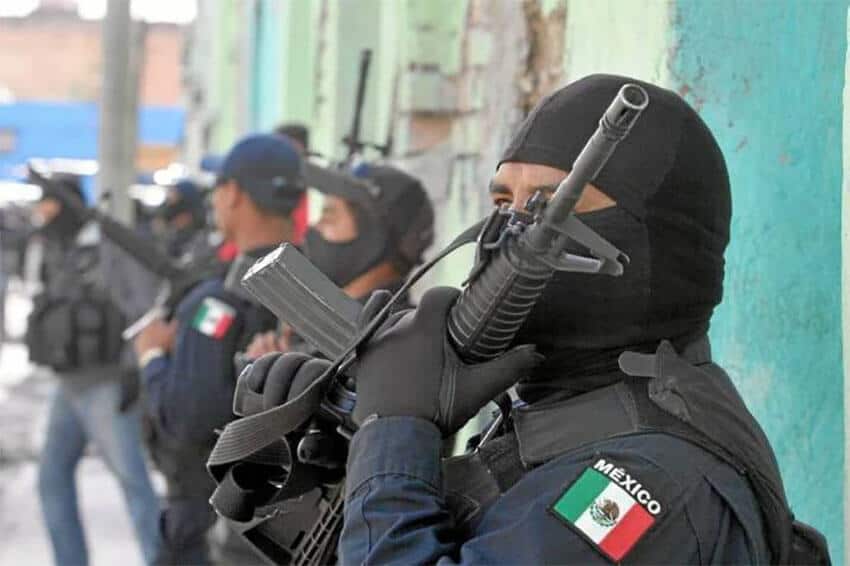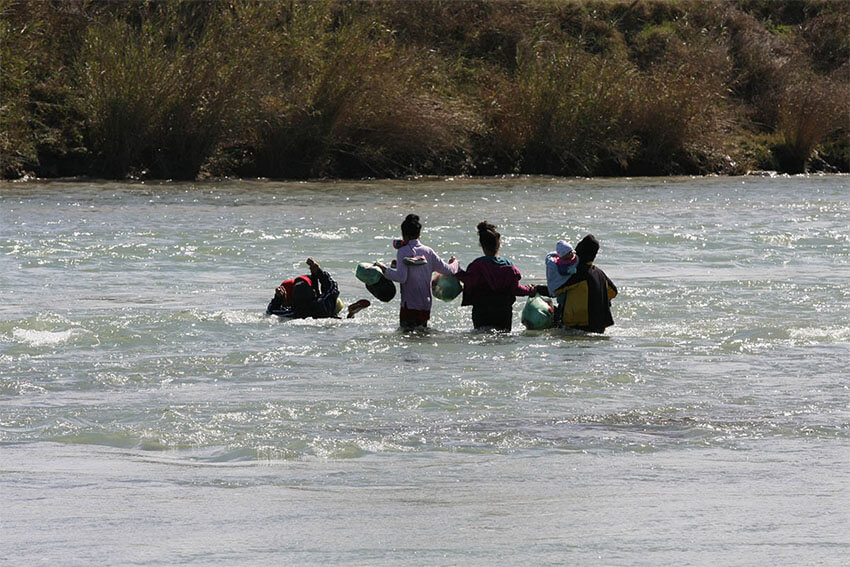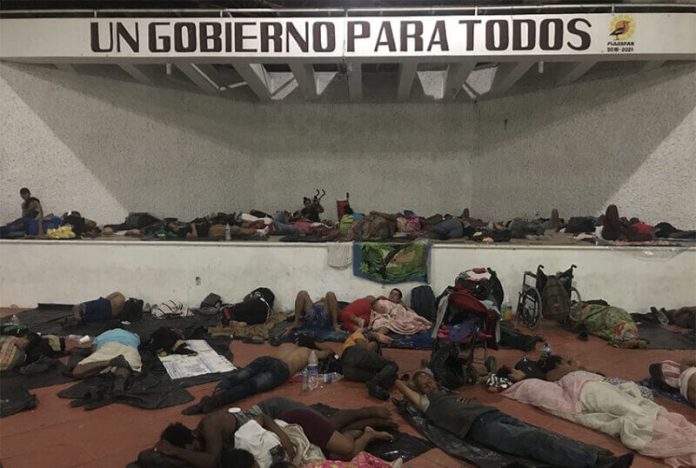On a dark, deserted highway somewhere in northern Mexico, hostage to a couple of dirty cops — that’s where Nicaraguan brothers José, 44, and Carlos, 40, thought their time was up.
They were on the south side of the United States border at Ciudad Acuña, Coahuila, in early December, attempting to cross. After months of struggle, they’d hired a trafficker to take them over the last hurdle.
When they arrived in Ciudad Acuña, they met the trafficker outside the bus terminal, but almost immediately, two balaclava-clad officials in police uniforms appeared. Swiftly, the officials suspended their rights, seizing their documents and cellphones. They took them for a drive in pitch-black darkness to the side of the highway.
The brothers said they suspected the officers were members of the Zetas — one of the most powerful cartels in Mexico’s northeast — who wanted to shut down the trafficker’s business operation.
“Sing,” one of the officials demanded of the trafficker, ordering him to give up information. After receiving a muted response, the heavyset officials took the trafficker out of sight behind the vehicle and beat him.
Stilled by fear, transfixed in the back seats, José and Carlos sat listening to the trafficker’s groans of pain and dwelled on their unknown future. With no better options, they said they closed their eyes and prayed.
“When I prayed, I thought about everything that had happened since leaving Nicaragua. I was thinking about whether it would hurt to die. I thought it could all end there, so tragically, so empty. Just another statistic of someone trying to follow their dream,” José said.

“Sincerely, I thought it was the last moment of my life. The officials looked at us with a thirst, a thirst to kill … I thought my life was only going to arrive at that point and that I’d end up with a bullet in the temple … But thank God it didn’t turn out how the devil wanted,” Carlos added.
Many prayers have gone unanswered in Mexico: missing migrants in the country spiked 292% in 2021 compared to the previous year, according to a report released in May by the human rights organization Jesuits’ Missing Migrant Search Program (SJM).
One contributor to the perils faced by Mexico’s vulnerable migrant population is U.S. legislation. Title 42 — a health decree introduced in March 2020 — allows the U.S. Customs and Border Patrol to immediately expel migrants under the pretext of containing the spread of the COVID-19 pandemic, rather than allowing them to solicit asylum.
Amid more than 1.7 million expulsions under Title 42, almost 10,000 migrants in Mexico have been subjected to kidnapping, torture and rape, and other violent attacks, the U.S. rights group Human Rights First reported in March.
Undeterred by the risks, the Nicaraguan brothers had endured a wearying journey battling through Honduras, Guatemala and Mexico in search of work, dollars and the added perk of freedom. They had marched among thousands — many of them women and children — in a migrant caravan in southern Mexico.
While in the caravan, beating their way across sweltering tarmac in defiance of security forces, it became clear that there was no way back. The incumbent president of Nicaragua, Sandinista revolution hero Daniel Ortega, had regained office for a fourth consecutive term in a disputed election. U.S. President Joe Biden derided the vote in Nicaragua as “a pantomime” that he said was “certainly not democratic.”
The brothers were sick of keeping silent under Ortega’s grip but were also pulled north by the opportunity to earn a decent wage and achieve some stability. It wasn’t the promise of great riches that drove them but the absurdity of exchange rates: the U.S. dollar is worth 36 times the Nicaraguan córdoba.
“There were a lot of motives for leaving Nicaragua,” José explained. “The dream of having a house of my own, the basic things. To create a company in the United States to help create employment back in Nicaragua.
“In Nicaragua, we don’t have the conditions for economic advancement, and [the authorities] can throw your life out at any moment. I thought, ‘I’m not going to wait for the world to change.’”
Now, on a forgotten highway, subject to the desires of corrupt officials, the brothers’ futures looked bleak. When the officials drove them to an abandoned neighborhood, José and Carlos were certain they would be killed. Their fears peaked, but to their puzzlement, they were released. They believe the trafficker was spared too.
The pair wasted no time ruminating over their lucky escape and traveled 90 kilometers to Piedras Negras, Coahuila, to wade through the river on New Year’s Eve, arriving in Eagle Pass, Texas, on the dawn of 2022. In Texas, they were picked up by U.S. immigration authorities, split up, and taken to separate detention centers.
Until their release, the brothers feared they would be returned to Mexico. Why they were freed from detention remains unclear to them. Help from a “sponsor” — a U.S. citizen willing to act as a legal guarantor — strengthened their case, but their nationality may have ultimately saved them from expulsion. Nicaraguans and Cubans have been difficult to deport under Title 42 due to Washington’s lack of diplomatic channels with the governments of those countries, according to the Washington Post.

However, that exception has changed since their release: in April, U.S. officials struck a deal with Mexican authorities to hand back migrants from Nicaragua and Cuba.
Freed from detention, each brother was taken separately to the bus station to start their 2,000-kilometer journeys to the west coast, where their sponsor, a distant relative, would receive them.
On their ride, they relaxed for the first time in months. In his exhaustion, José said, that first opportunity for reflection brought him to tears.
Carlos, meanwhile, experienced a surge of joy. “When I left detention, I felt like I was breathing pure air. I felt great peace and freedom in my heart. I felt safer and more sure of myself. I felt like a bird when it’s released from its cage and allowed to fly into the sky … I still have economic problems, but those resolve themselves with time. This is a land of great opportunity, especially for the people who know how to make the most of them. I thank God for this opportunity,” he said.
The brothers’ asylum hearings are scheduled for October. Short on cash, they have been forced in the meantime to break the law and work in secret — paid US $15 an hour to clean an industrial warehouse. Their right to work legally in the U.S. will ultimately depend on the court’s decision in October.
Hope is carrying them for now: they’ve bought themselves cars and laptops. José plans to start a graphic design company, which was his profession in Nicaragua. Carlos plans to keep working for his salary in the warehouse.
“There’s a world of differences … here you’ve got to do things the right way, with discipline … They’re a good bunch, the gringos,” José said.
“We’re in the promised land,” Carlos added.
The brothers are safe for now, but most displaced migrants are less fortunate: still on the move, physically unsettled by a political decree that blocks them from entering U.S. territory. Those who make it to the border have fought their way through an obstacle course of security forces and detention centers, against the lingering threat of dangerous criminals. But despite their dedication, those migrants are unlikely to find refuge anytime soon: more than 20 U.S. states joined a lawsuit in April seeking to block Title 42 from being rescinded. That lawsuit’s validity rests on an impending court decision.
The U.S. government has promised to lift Title 42 by May 23, but a judge is set to rule on the lawsuit before that date. The fate of many thousands of migrants hangs precariously in the balance.
The names of the people interviewed for this story have been changed to protect their identities.
Mexico News Daily
